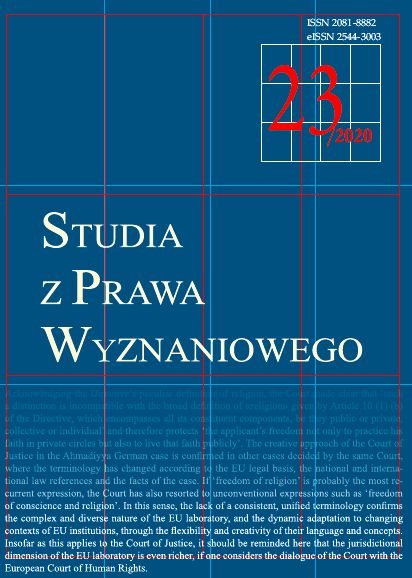Riflessioni sul diritto di satira e i suoi limiti
Reflections about the right of satira and its limits
Author(s): Gaetano DammaccoSubject(s): Law, Constitution, Jurisprudence, Constitutional Law, Criminal Law, Civil Law, Human Rights and Humanitarian Law, Court case
Published by: Katolicki Uniwersytet Lubelski Jana Pawła II - Wydział Prawa, Prawa Kanonicznego i Administracji
Keywords: satira; religione; diritti umani; limiti; satire; religion; human rights; limitations; freedom of conscience and religion;religious freedom;
Summary/Abstract: Satire is an extreme paradigm of freedom of expression, but uncertainties exist about its conceptual definition and related legal regime. The development of communication has produced numerous literary figures similar to each other such as the chronicle (an impersonal and non-interpretive recording of events that have occurred), criticism (subjective analysis and judgment relating to events that have occurred) and satire (sarcastic criticism of characters, behaviors and actions of individuals for the purpose of social denunciation). The elements that characterize the satire, developed over the centuries, are essentially twofold: attention to contradictions (of politics, society, religion, culture) and moralistic intent to promote social change. Religious satire affects ecclesiastical power and its contradictions, but it also affects religious symbols and the contents of religions. Different legal consequences follow. When it affects the patrimony of faith of believers it is not acceptable. Religious satire generates a kind of conflict between different constitutional values, that is, between the right to the free expression of thought and the right to the reputation and protection of religious feelings. The right to satire in general is recognized by legal systems (both international and national) as a subjective right of constitutional relevance, which derives from the freedom of expression and thought. In the Charter of Fundamental Rights of the European Union, thought, conscience and religion are homologous (as legal goods or as ethical values). Therefore, thought, conscience and religion cannot be in opposition to each other. Considerable uncertainties exist about the legal discipline of the right to satire, which can never offend the fundamental rights of the person, his dignity and his reputation. The Nice Charter has favored an orientation which considers the right of free expression in its broadest and most expansive form. However, the prevailing value of fundamental human rights has always been affirmed, which cannot be offended by the exercise of the right to satire. The strength of the right to satire consists in the recognition of its constitutional rank, but also in the limits it must have. The jurisprudence has elaborated the “formal” obligations, among which the most important are: continence and functionality.
Journal: Studia z Prawa Wyznaniowego
- Issue Year: 2020
- Issue No: 23
- Page Range: 101-121
- Page Count: 21
- Language: Italian

